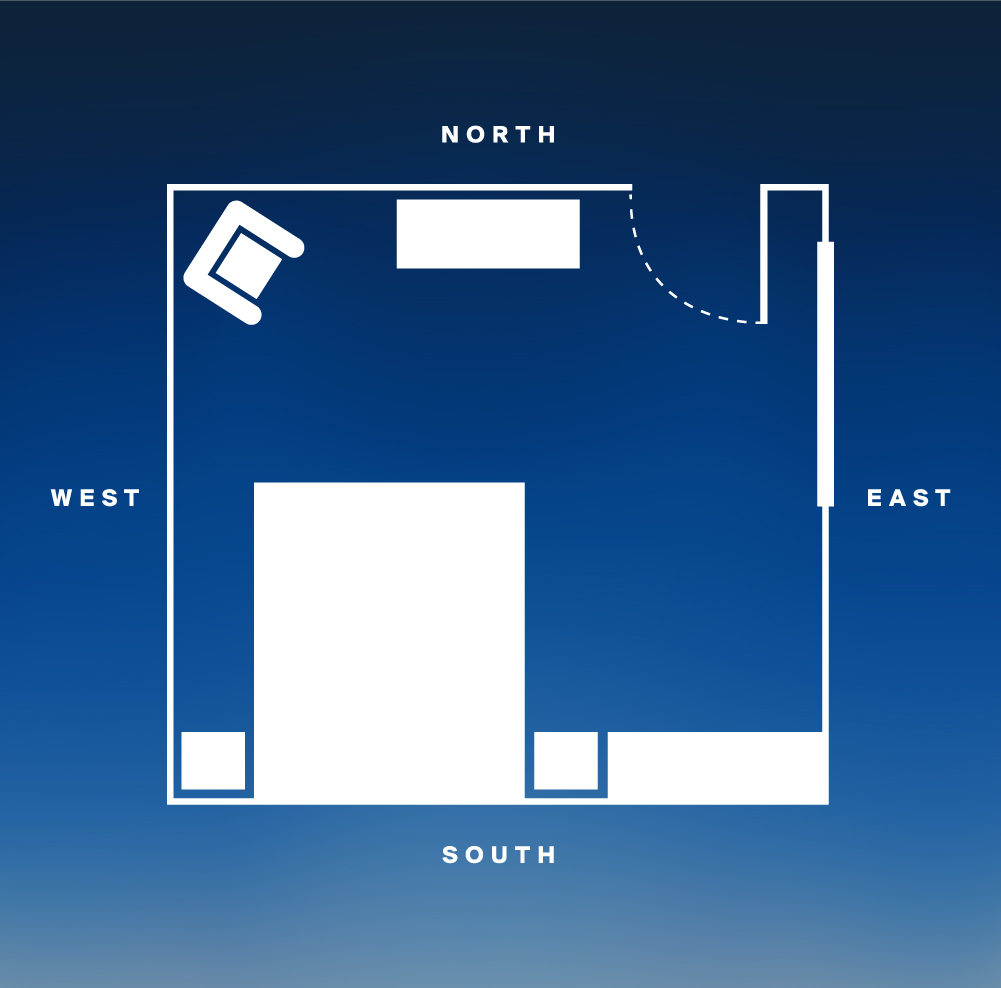Two ancient principles — feng shui and vastu shastra — use directions and the elements to bring you and your home into harmony. Both methods focus on the same end goals, but the two philosophies take different paths to get there. If tension and stress cause you to toss and turn, try these tips to incorporate feng shui or vastu shastra principles in your bedroom to create more tranquil energy and a better sleeping space.
Bedroom Vastu Shastra: The Science of Architecture

The Hindu principle of vastu shastra has a literal definition of “science of architecture.” The method dictates optimal placements and layouts for various rooms in the home. “Vastu Shastra is more than 6,000 years old,” says Dr. Rewa Kumar, a vastu shastra specialist based in the San Francisco Bay Area.
Dr. Kumar says that vastu shastra incorporates the eight directions, the five elements of nature (wood, fire, earth, metal, water), and the nine planets. When the home aligns with these principles, you experience prosperity, good health, wealth, success, and positive relationships.
According to vastu shastra, you won’t sleep well if your head points north. “The head is the north part of the body,” says Dr. Kumar. “Let energy travel north to south.”
Ideally, place the bed in the southwest area of the bedroom with the head of the bed facing south, southwest or west. Avoid southeast placement, as this is a “fire place,” and placement there can lead to arguments, according to Dr. Kumar. Keep windows to the right or left of the bed, but not behind you. Also, your feet should never face the entrance or the toilet. “You will not get settled and will have bad relations,” she says.
Color energy also comes into play in vastu shastra. If your bedroom is in the home’s southwest area, paint one wall a dark color — but not black or red, which cause emotional stress —and paint the remaining walls a light, neutral color.
The powerful southwest corner of your bedroom relates to prosperity. Keep jewelry, financial papers and other things you want to grow in that corner. Avoid open doors and windows in the southwest; otherwise, money will “fly away.”
Vastu shastra, feng shui, and sleep experts all agree that you should keep electronics out of the bedroom. If you must have a computer or cellphone in the bedroom, don’t place it under the bed. “Also, don’t use the personal bedroom as an office space,” Dr. Kumar adds. “This brings negativity.”
Bedroom Feng Shui: The Art of Placement

A relative newcomer compared to vastu shastra, feng shui history only dates back 3,500 years. Feng shui, the Chinese philosophical system, harmonizes people with the surrounding environment. Qi, or life force energy, plays an essential role in feng shui, as Qi relates to the orientation of a structure with its natural environment.
As with vastu shastra, the directions and five elements influence feng shui along with the concept of yin yang, or polarity. Using these principles, feng shui aims to balance energy through the proper placement of furniture and belongings. Form school, the oldest form of feng shui, is the easiest to apply in western culture, according to feng shui expert Laura Carrillo, owner of Narrative Space Feng Shui. “It’s about making the most of a floor plan as it exists,” she says.
The bedroom is the most important room to have aligned with feng shui. “The bedroom is where we re-energize,” Carrillo says. “It’s the most sacred space you have. We know we need sleep. That makes feng shui critical in the bedroom.”
Bed size is important for restful sleep and for a healthy romantic relationship. If you’re single, a queen-size bed indicates you’re making space for another. If you’re coupled, it creates an energy of togetherness. On the other hand, a twin bed says you don’t have room for anyone else. Also, make sure your bedroom isn’t as big as a living room. “There’s something to be said for the cozy nook,” says Carrillo.
Place the bed against a solid wall, with a view of the door but not in direct line with the door. A direct line leaves you vulnerable, as does sleeping with your back facing the door. The headboard, preferably wood, fosters a sense of stability. “The headboard represents balanced and supportive relationships,” says Carrillo. If you don’t have a headboard, add large pillows behind your sleeping pillows until you can purchase a headboard. You should also avoid putting your bed beneath or blocking a window, as this is said to bring in sleep disrupting chi.
Like vastu shastra, feng shui discourages mirrors in the bedroom in most cases. “Mirrors generate active chi, which keeps the room awake at night,” says Carrillo. Cover mirrors at night to quiet the energy in the room.
Color also makes a strong impression. Choose subtle tones such as beige, cream, and brown for your room. (The National Sleep Foundation recommends the same.) “Flesh tones support sleep,” says Carrillo. “They also allow people to be more vulnerable.” Paint walls in calm colors such as light blue and green.
If you have a green thumb, consider bringing a bit of nature into the bedroom. Although vastu shastra and some feng shui schools discourage plants (fresh flowers are okay), other experts believe in their soothing properties. Just make sure you take care of them. “Dead plants symbolize unhealthy or dead chi,” says Carrillo. “I recommend removing or replacing them immediately.”
Whether you focus on vastu shastra’s attention to direction or feng shui’s bedroom guidelines on placement, you may find that a few changes in the bedroom leave you feeling more rested, less stressed, and less argumentative, all of which can lead to greater energy harmony in your life.
